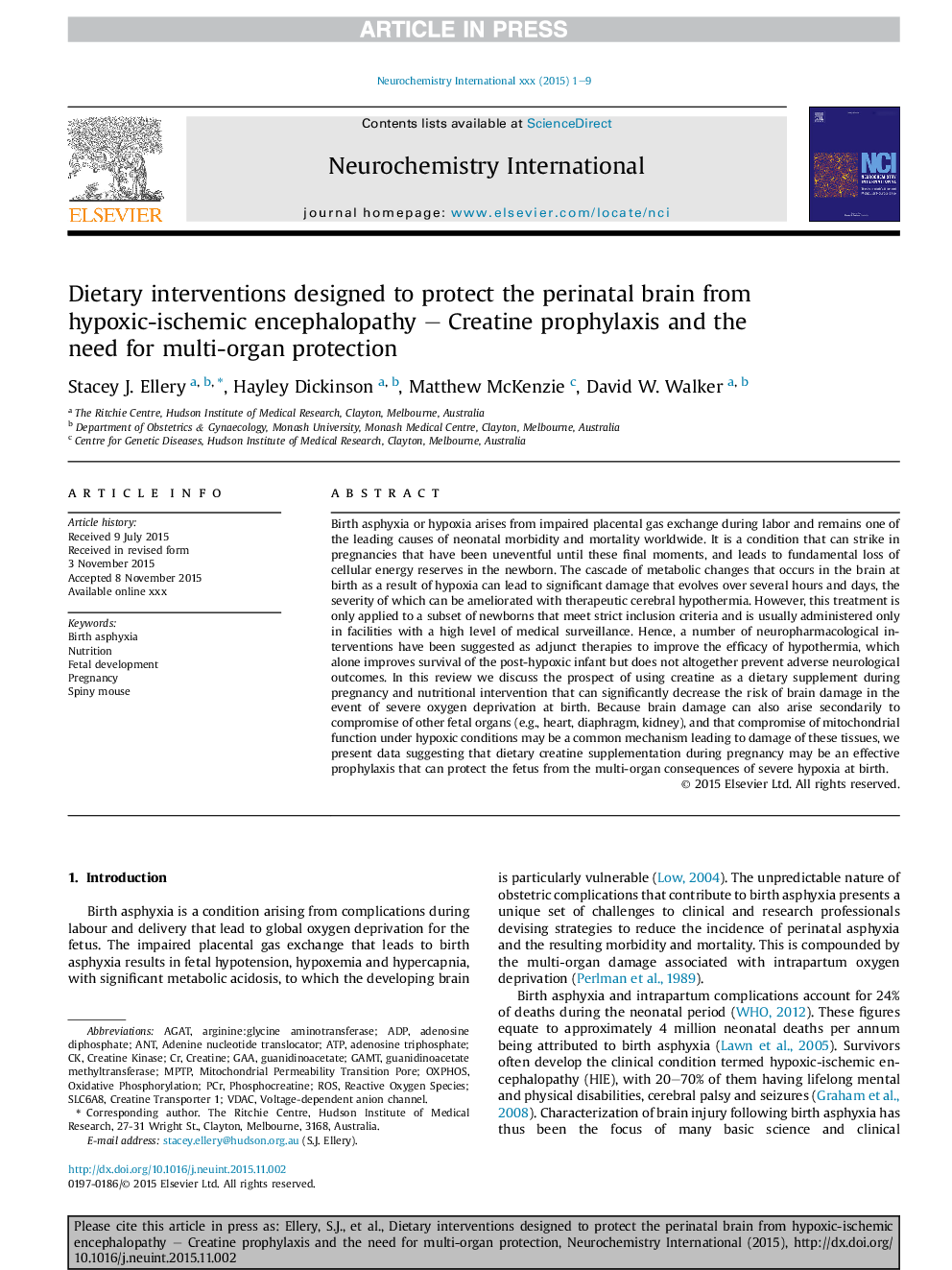| کد مقاله | کد نشریه | سال انتشار | مقاله انگلیسی | نسخه تمام متن |
|---|---|---|---|---|
| 8479061 | 1551280 | 2016 | 9 صفحه PDF | دانلود رایگان |
عنوان انگلیسی مقاله ISI
Dietary interventions designed to protect the perinatal brain from hypoxic-ischemic encephalopathy - Creatine prophylaxis and the need for multi-organ protection
ترجمه فارسی عنوان
مداخلات تغذیه ای طراحی شده برای محافظت از مغز پرناتال از آنسفالوپاتی ایسکمی هیپوکسیک - پیشگیری از کراتین و نیاز به حفاظت از چندین عضو
دانلود مقاله + سفارش ترجمه
دانلود مقاله ISI انگلیسی
رایگان برای ایرانیان
کلمات کلیدی
VDACGAAAGATMPTPADPOXPHOSANTSLC6A8ROS - ROSAdenosine Triphosphate - آدنوزین تری فسفاتATP - آدنوزین تری فسفات یا ATPadenosine diphosphate - آدنوزین دی فسفاتmitochondrial permeability transition pore - انتقال نفوذی میتوکندری منفی استPregnancy - بارداریadenine nucleotide translocator - ترجمه آدنین نوکلئوتیدیNutrition - تغذیهFetal development - توسعه جنینBirth asphyxia - تولد آسفیکسیPhosphocreatine - فسفریکراتینOxidative phosphorylation - فسفوریلاسیون اکسیداتیوSpiny mouse - موش نازکPCR - واکنش زنجیرهٔ پلیمرازvoltage-dependent anion channel - کانال آنیون وابسته به ولتاژcreatine - کراتینCreatine kinase - کراتین کینازGAMT - گامGuanidinoacetate methyltransferase - گوانیدین آکیته متیل ترانسفرازGuanidinoacetate - گوانیدین اسیدهاReactive oxygen species - گونههای فعال اکسیژن
ترجمه چکیده
زوال آسفیکسی یا هیپوکسیا ناشی از اختلال در جریان گاز جفتی در طول زایمان است و همچنان یکی از دلایل عمده مرگ و میر نوزادان در سراسر جهان است. این شرایطی است که می تواند در حاملگی هایی که تا این لحظات نهایی به وقوع پیوسته است، اعتصاب کند و منجر به از دست رفتن بنیادی ذخایر انرژی سلولی در نوزادان شود. آبشار تغییرات متابولیک که در هنگام تولد در نتیجه هیپوکسی اتفاق می افتد می تواند منجر به آسیب قابل توجهی شود که طی چند ساعت و روز تحریک می شود و شدت آن می تواند با هیپوترمی درمانی مغزی بهبود یابد. با این حال، این درمان فقط برای یک زیرمجموعه از نوزادان است که با معیارهای انعطاف پذیری مواجه هستند و معمولا فقط در امکانات با سطح بالایی از نظارت پزشکی اداره می شود. از این رو، تعدادی از مداخلات عصبی-فیزیولوژیک به عنوان درمان های جانبی برای بهبود اثربخشی هیپوترمی پیشنهاد شده است که به تنهایی باعث بهبودی بقای نوزاد پس از هیپوکسیک می شود، اما در مجموع از پیشگویی های عصبی مصون نیست. در این بررسی ما در مورد استفاده از کراتین به عنوان مکمل غذایی در دوران بارداری و مداخلات تغذیه بحث می کنیم که می تواند خطر آسیب مغزی را در صورت محرومیت شدید اکسیژن در هنگام تولد کاهش دهد. از آنجا که آسیب مغزی می تواند به طور ثانویه به سازش با سایر ارگان های جنین (به عنوان مثال، قلب، دیافراگم، کلیه) ایجاد شود و سازش عملکرد میتوکندری تحت شرایط هیپوکسی ممکن است یک مکانیزم رایج برای آسیب رساندن به این بافت ها باشد، مکمل کراتین در طول بارداری ممکن است یک پیشگیری موثر باشد که می تواند جنین را از عواقب چندگانگی هیپوکسی شدید در هنگام تولد محافظت کند.
موضوعات مرتبط
علوم زیستی و بیوفناوری
بیوشیمی، ژنتیک و زیست شناسی مولکولی
بیولوژی سلول
چکیده انگلیسی
Birth asphyxia or hypoxia arises from impaired placental gas exchange during labor and remains one of the leading causes of neonatal morbidity and mortality worldwide. It is a condition that can strike in pregnancies that have been uneventful until these final moments, and leads to fundamental loss of cellular energy reserves in the newborn. The cascade of metabolic changes that occurs in the brain at birth as a result of hypoxia can lead to significant damage that evolves over several hours and days, the severity of which can be ameliorated with therapeutic cerebral hypothermia. However, this treatment is only applied to a subset of newborns that meet strict inclusion criteria and is usually administered only in facilities with a high level of medical surveillance. Hence, a number of neuropharmacological interventions have been suggested as adjunct therapies to improve the efficacy of hypothermia, which alone improves survival of the post-hypoxic infant but does not altogether prevent adverse neurological outcomes. In this review we discuss the prospect of using creatine as a dietary supplement during pregnancy and nutritional intervention that can significantly decrease the risk of brain damage in the event of severe oxygen deprivation at birth. Because brain damage can also arise secondarily to compromise of other fetal organs (e.g., heart, diaphragm, kidney), and that compromise of mitochondrial function under hypoxic conditions may be a common mechanism leading to damage of these tissues, we present data suggesting that dietary creatine supplementation during pregnancy may be an effective prophylaxis that can protect the fetus from the multi-organ consequences of severe hypoxia at birth.
ناشر
Database: Elsevier - ScienceDirect (ساینس دایرکت)
Journal: Neurochemistry International - Volume 95, May 2016, Pages 15-23
Journal: Neurochemistry International - Volume 95, May 2016, Pages 15-23
نویسندگان
Stacey J. Ellery, Hayley Dickinson, Matthew McKenzie, David W. Walker,
